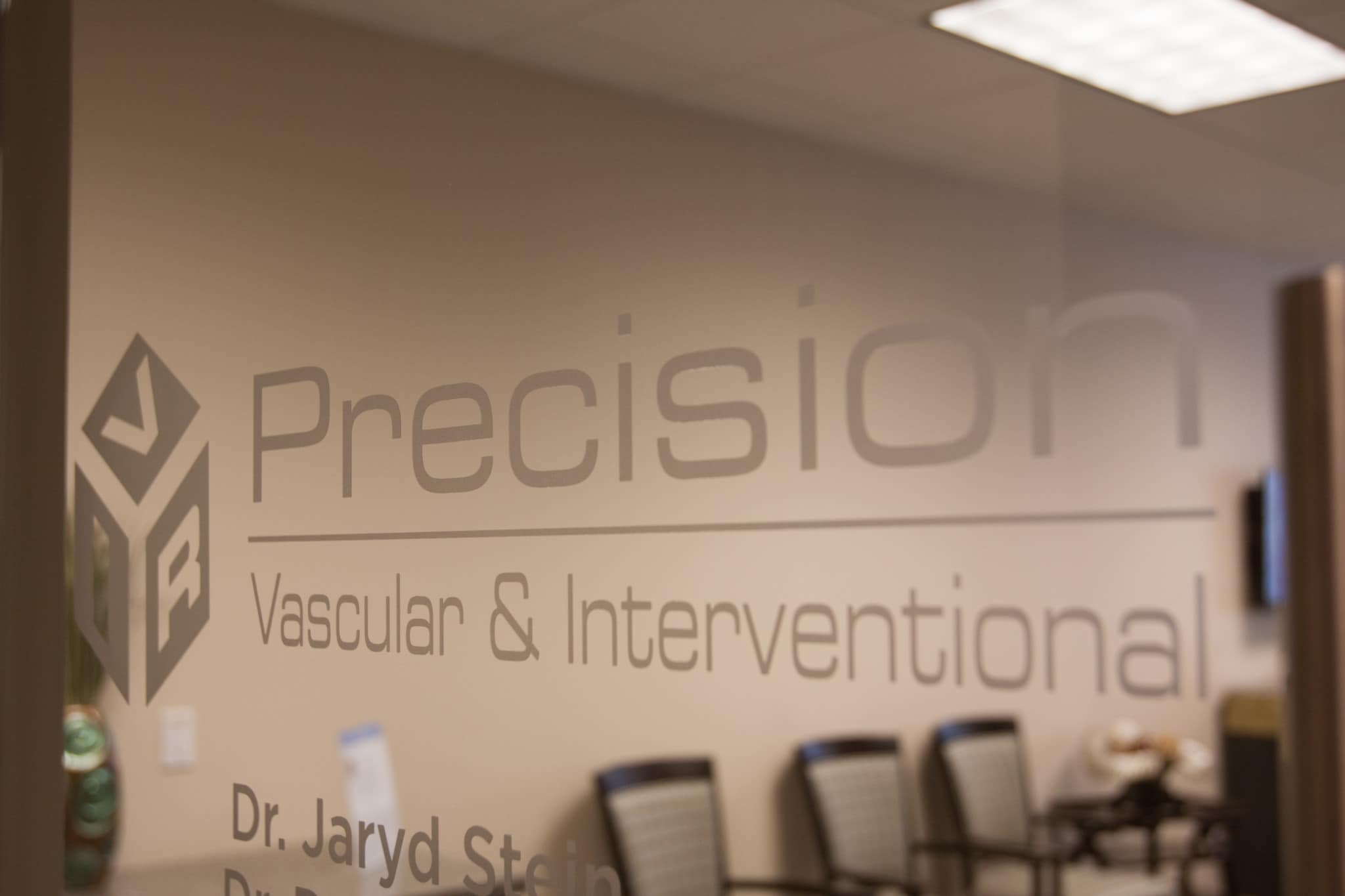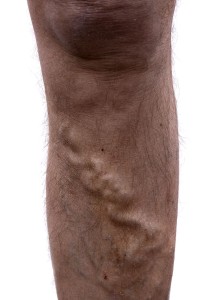 Up to a fourth of all patients with varicose veins and lower extremity venous insufficiency will have an episode of clotting of a varicosity. This can be nearly invisible or can be located just underneath the skin. This condition is called acute superficial thrombophlebitis. The condition causes pain and discomfort but is usually self-limiting. It should, however, be differentiated and monitored to prevent conversion to a more serious condition of deep vein thrombosis. Deep vein thrombosis involves clot migration or formation in the deep veins of the leg, a potentially life-threatening situation. Learn more.
Up to a fourth of all patients with varicose veins and lower extremity venous insufficiency will have an episode of clotting of a varicosity. This can be nearly invisible or can be located just underneath the skin. This condition is called acute superficial thrombophlebitis. The condition causes pain and discomfort but is usually self-limiting. It should, however, be differentiated and monitored to prevent conversion to a more serious condition of deep vein thrombosis. Deep vein thrombosis involves clot migration or formation in the deep veins of the leg, a potentially life-threatening situation. Learn more.
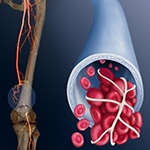 Precision specializes in the diagnosis and treatment of blood clots within both the deep and superficial venous system. Blood clots often cause pain and swelling of the affected limb and can be a life-threatening condition. Blood clots rarely dissolve completely on their own and can often lead to permanent damage of the veins and possible life-long side effects called post-thrombotic syndrome (PTS). Learn more.
Precision specializes in the diagnosis and treatment of blood clots within both the deep and superficial venous system. Blood clots often cause pain and swelling of the affected limb and can be a life-threatening condition. Blood clots rarely dissolve completely on their own and can often lead to permanent damage of the veins and possible life-long side effects called post-thrombotic syndrome (PTS). Learn more.
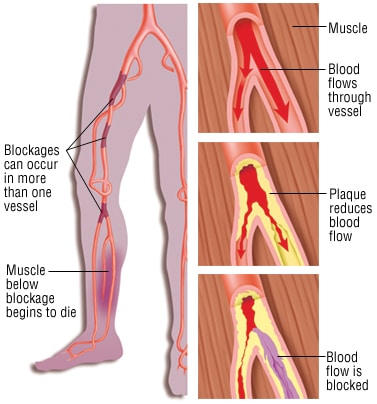 Peripheral arterial disease (PAD), also known as peripheral vascular disease (PVD), is a very common condition affecting 20% of Americans age 65 and older. PAD develops most commonly as a result of atherosclerosis, or hardening of the arteries, which occurs when cholesterol and scar tissue build up, forming a substance called plaque inside the arteries. This is a very serious condition. The clogged arteries cause decreased blood flow to the legs, which can result in pain when walking, and eventually gangrene and amputation. Learn more.
Peripheral arterial disease (PAD), also known as peripheral vascular disease (PVD), is a very common condition affecting 20% of Americans age 65 and older. PAD develops most commonly as a result of atherosclerosis, or hardening of the arteries, which occurs when cholesterol and scar tissue build up, forming a substance called plaque inside the arteries. This is a very serious condition. The clogged arteries cause decreased blood flow to the legs, which can result in pain when walking, and eventually gangrene and amputation. Learn more.
 A varicocele is a varicose vein of the testicle and scrotum that may cause pain and lead to testicular atrophy (shrinkage of the testicles). In healthy veins within the scrotum, one-way valves allow blood to flow from the testicles and scrotum back to the heart. In a varicocele, these valves do not function properly, causing blood to pool enlarging the vein. The heat from the pooling blood raises the temperature of the scrotum causing a severe decrease in sperm count and sperm motility and increase in the number of deformed sperm. The incidence of varicoceles can be up to 30 percent in couples who are having difficulty in conceiving. Learn more.
A varicocele is a varicose vein of the testicle and scrotum that may cause pain and lead to testicular atrophy (shrinkage of the testicles). In healthy veins within the scrotum, one-way valves allow blood to flow from the testicles and scrotum back to the heart. In a varicocele, these valves do not function properly, causing blood to pool enlarging the vein. The heat from the pooling blood raises the temperature of the scrotum causing a severe decrease in sperm count and sperm motility and increase in the number of deformed sperm. The incidence of varicoceles can be up to 30 percent in couples who are having difficulty in conceiving. Learn more.
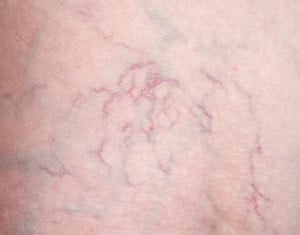 Spider veins are superficial small bands of pooled blood vessels (veins) located just under the skin. Most often spider veins do not outwardly bulge. Spider veins alone is not necessarily a condition that a requires medical attention. There is a strong hereditary component that contributes to the formation of spider veins. Spider veins however can be an indication of an deeper issue of chronic venous insufficiency (CVI). Chronic venous insufficiency of the lower extremities is a term for a vein disorder that causes blood to flow backwards and pool in the legs. If a deeper issue such as CVI is identified, treatment of CVI via ablation or removal will often help prevent or delay additional spider veins from forming. At Precision, our experts will be able to help assess and detect CVI with a thorough physical exam and duplex ultrasound. Learn more.
Spider veins are superficial small bands of pooled blood vessels (veins) located just under the skin. Most often spider veins do not outwardly bulge. Spider veins alone is not necessarily a condition that a requires medical attention. There is a strong hereditary component that contributes to the formation of spider veins. Spider veins however can be an indication of an deeper issue of chronic venous insufficiency (CVI). Chronic venous insufficiency of the lower extremities is a term for a vein disorder that causes blood to flow backwards and pool in the legs. If a deeper issue such as CVI is identified, treatment of CVI via ablation or removal will often help prevent or delay additional spider veins from forming. At Precision, our experts will be able to help assess and detect CVI with a thorough physical exam and duplex ultrasound. Learn more.
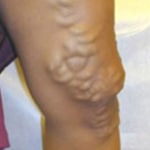 Varicose veins are veins that are in the superficial compartment of the leg that have become enlarged, swollen, twisted, and/or bulging due to venous reflux disease. The visible veins can be many colors but are most commonly red, blue or flesh-toned. The bulging veins most often appear on the thighs, back of the calves, and the inside of the legs. Pregnant women may experience varicose veins in the vaginal, pelvic and buttocks area. When these veins appear they may indicate a issue of venous reflux disease in the legs or may be a symptom of a pelvic venous issue. At Precision we are can help diagnose all venous issues including that of pelvic venous insufficiency. Learn more.
Varicose veins are veins that are in the superficial compartment of the leg that have become enlarged, swollen, twisted, and/or bulging due to venous reflux disease. The visible veins can be many colors but are most commonly red, blue or flesh-toned. The bulging veins most often appear on the thighs, back of the calves, and the inside of the legs. Pregnant women may experience varicose veins in the vaginal, pelvic and buttocks area. When these veins appear they may indicate a issue of venous reflux disease in the legs or may be a symptom of a pelvic venous issue. At Precision we are can help diagnose all venous issues including that of pelvic venous insufficiency. Learn more.
 Our doctors specialize in the diagnosis of chronic pelvic pain syndrome, as well as non-surgical treatments for this disease. This debilitating disease is far more common than most women (and their Gynecologists) realize and is often caused by Pelvic Congestion Syndrome.
Our doctors specialize in the diagnosis of chronic pelvic pain syndrome, as well as non-surgical treatments for this disease. This debilitating disease is far more common than most women (and their Gynecologists) realize and is often caused by Pelvic Congestion Syndrome.
Women with chronic pelvic pain caused by Pelvic Congestion Syndrome (PCS) can have disabling pain, often during intercourse or with other activities such as prolonged standing. Women frequently suffer from symptoms for years before the diagnosis is made and treatment is offered. Learn more.
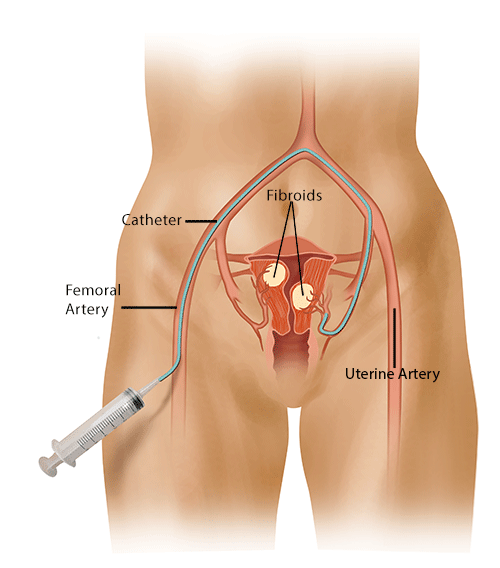 Uterine fibroids are benign tumors in the middle layer of the uterus, the muscular layer that causes contractions during labor.
Uterine fibroids are benign tumors in the middle layer of the uterus, the muscular layer that causes contractions during labor.
A tumor is an abnormal growth of cells and tissue. Benign tumors are non-cancerous and do not spread. Cancers are called malignant tumors because they do spread to other parts of the body.
Uterine fibroids are made of nodules of smooth muscle cells and fibrous tissue that develop in the wall of the uterus. Fibroids may grow as a single nodule or in clusters. They may range in size from 1/10 of an inch to 8 inches in diameter. Uterine fibroids may grow in the wall of the uterus, or they may project into the interior cavity or toward the outer surface of the uterus. Learn more.
To schedule an appointment please call us at 214-382-3200 or complete the form below.
Precision VIR serves the DFW area including Dallas, Fort Worth, Carrollton, Richardson, Garland, Mesquite, Highland Park, University Park, Park Cities, Plano, Frisco, Allen, McKinney, Flower Mound, Lewisville, Denton, Arlington, Irving, Grand Prairie and all of North Texas.
Prior to starting any new treatment or questions regarding a medical condition, always seek the advice of your doctor or other qualified health provider. This information is not a substitute for professional medical advice.

